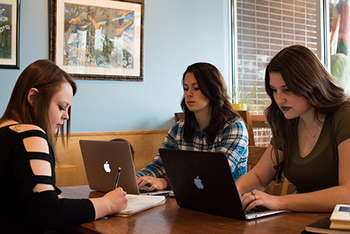
Liv Volkman-Johnson / Winonan
The dream of getting paid to follow a passion comes true for three Winona State University students each year.
Winona State’s English department is hosting its second annual Winona Prize for Creative Writing competition, which offers three $1,500 prizes to students for their creative writing pieces in poetry, fiction and creative non-fiction.
According to English professors Elizabeth Oness and Gary Eddy, the competition was founded by an anonymous benefactor, a former Winona State student whose mother had a passion for reading.
“He endowed us with this prize money starting last year because he wanted to give a substantial scholarship to encourage creative work,” Oness said.
Eddy added, “I’m so delighted that our benefactor has chosen to do this. This is just a wonderful boost for our program and an acknowledgment of how wonderful our students really are.”
According to Oness, who supervises the competition, the creative writing faculty received almost 100 submissions between the three available categories last year.
This year, the English department accepted submissions through Nov. 7, and late submission will be accepted through Nov. 11.
The creative writing faculty, which includes Oness and Eddy, sifts through the initial submissions and each faculty member chooses 10 pieces to forward onto the guest judges who select the three winners, according to Oness.
The winning pieces, along with a number of other student works, are published in “Satori,” Winona State’s literary magazine. According to Eddy, “Satori” has been published since 1974 and new issues are released every spring.
“Writing is very often a lonely business and to have your work recognized for the quality it bears is enormously encouraging and can turn someone into a lifelong writer,” Eddy said.
Overseen by Eddy, the magazine is created and edited by Winona State student and holds a live reading of the works shortly after its release. Last year’s prose editor, Ana Alexander, also won the prize for creative nonfiction.
Alexander, Leah Perri and Kaysey Price won the competition last year.
“The Winona Prize in Creative Writing is an amazing opportunity for aspiring writers to put their work out there,” Alexander said. “I pretty much had nothing to lose by entering, so I just went for it.”
Alexander’s winning piece, “Stuck in the Clouds,” was inspired by an assignment for a creative nonfiction class, where she had to write about a “quest or adventure.”
Alexander also happened to have a skydive scheduled for the weekend after the essay was assigned.
“So, I decided that jumping out of an airplane seemed like enough of an adventure to write about,” Alexander said.
According to Alexander, winning not only gave her the opportunity to be published in “Satori” and be validated for her hard work, but it also gave her the chance to travel through 13 states with her best friend.
“Dr. Armstrong, who we’d all taken poetry courses with, told us that we should spend our winnings on something poetic,” Alexander said. “Some of the things I saw were honestly gut-wrenching. It changed my perspective on the world and the people who inhabit it, and if that’s not poetry, I don’t know what is.”
Oness claims that many applicants have already written pieces for other courses, including the creative writing course English 222, which is required for entering the contest.
“English 222 is a pretty interesting class because we get students from the sciences and from all kinds of backgrounds and a lot of them write some terrific stuff. So you don’t have to just be an English geek to apply,” Oness said. “I think students often feel like ‘Oh I’m not good enough.’ And it doesn’t matter. Submit. Give it a shot. What do you have to lose? There’s no entry fee or anything like that, and you never know,”
Eddy said he also believes there are benefits for students of all majors to enter the competition.
“This is practice for the career because the contemporary American literary scene is loaded with contests. And the experience of winning and losing and honorable mention is really part of the experience of being a writer,” Eddy said. “You can’t win if you don’t play. And if you don’t play, you’ll never know the joy of it.”
Alexander, along with Oness and Eddy, also hopes that students will take advantage of the benefits the competition has to offer, even if they do not win.
“It’s definitely made an incredible impact on my life, and I’m proud to have graduated from a university that treasures the arts, even once students have left campus,” Alexander said.
-By Liv Volkman-Johnson







































